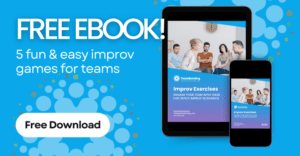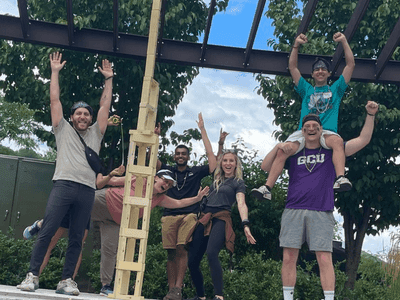When was the last time you used improv for business? To answer this question, just think about the last time you attended a meeting, sales call, or brainstorming session—for most people, they’re one and the same.
You have a plan, but the conversation takes a turn you weren’t expecting. What do you do? You improvise! You adapt, react, and pivot with as much confidence as you can manage.
In an episode of our Team Building Saves the World podcast on business storytelling, author and sales expert Robert Mattson explained this concept very well:
“What is a sales call, or what is an investor meeting, or what is a CEO talking to their employees except improv? It’s like, ‘I know my script. I know what I’m gonna talk about, but I know things are gonna go wrong and people are gonna ask questions I’m not ready for. I have to have a bunch of stuff prepped in my back pocket that I can haul out so it looks like I’m smooth.’ That’s called business improv!”
Whether you’re leading a meeting, addressing a crisis, or closing a deal with a client, business improv gives you an edge when you know what you’re doing.
This guide explores the art of using improv for business, complete with insights and tips to help you start applying it with intention.
What Is Improv, and How Does It Apply to Business?
First things first—improv is short for improvisation, and it’s all about building off of what’s given to you using a technique known as “yes, and.” In other words, you’ll accept what’s presented to you and then add to the conversation.
This isn’t just a trick for actors and comedians, or a simple way to have fun with friends; improv is a crucial skill in business environments. No matter what industry you’re in, you’ll come across unexpected challenges and responses every single day.
You have to accept what’s presented—by saying “yes”—and then add to it with your own ideas—by following that up with “and”—on the fly, whether or not you focus on these skills. So why sell yourself and your team short? Training improv skills makes it easier to go with the flow.
Business Improvisation 101
But… How do you start reaping the benefits of improv for business? It all starts with improving the soft skills that support the “yes, and” method.
Here are some of the skills that contribute to amazing improv and business:
- Active Listening: Professional success (and improv) hinges on really listening to what someone is saying with your full attention. From there, you can digest it and offer a thoughtful reply. This differs from how many people wait until it’s their turn to say what they want to say, hardly listening to their conversation partners.
- Adaptability: Sometimes clients hit you with a totally different direction in the middle of a meeting, ideal marketing strategies for your industry change overnight, or your manager isn’t feeling an idea you thought they’d love—these situations demand quick thinking and the ability to adapt to a changing situation. In other words, the call for improvisation methods.
- Collaboration: Great ideas rarely thrive in isolation—improv requires collaboration so you can build off of what someone presents to you. It’s how the genius is born, and it requires trust and teamwork.
- Confidence Under Pressure: When you think of a fantastic leader, you probably imagine someone who can handle objections, tricky questions, and leadership with ease. Improv training for business (and theater) can help you learn to do all of the above.
- Creative Problem-Solving: Business improv helps teams innovate and generate solutions on the spot by creatively building off each other’s ideas. Using improv for business both improves your creative problem-solving abilities and requires you to be willing to come up with outside-the-box solutions to new problems.
Each of these skills can be built and strengthened through improv training while also contributing to good improv. For example, your improv skills benefit from improving your active listening, and practicing improv skills will help you get even better at active listening, which in turn improves your improv skills, and so on.
The Benefits of Improv: Effects On the Workplace
Now that you’ve refreshed yourself on what improv is, let’s dig into the benefits! We’ll explore some perks that help explain why we believe that all leaders can benefit from embracing improvisational techniques and training.
Trust us, the benefits of improv extend far beyond the stage and right into the office. Here’s what we’re talking about:
1. Better Teamwork and Communication
In many ways, successful teams often work together the same way improv troupes do. They listen to each other, build off the ideas they’re presented with, and come up with responses that make everyone look good. And in doing so, they get much better at collaboration via teamwork and communication.
Team improv training for business is a surefire way to get everyone laughing and having fun. This strengthens their workplace bonds, makes interpersonal communication more effective, and strengthens teamwork. Your team will also get better at using the power of storytelling to communicate their points.
2. Improved Leadership and Presentation Skills
Great leaders often have similar traits—think charismatic, adaptable, quick on their feet—and improv training helps with all of these. It can help you command attention in meetings, inspire your teams, and build trust with colleagues, all because you know how to adapt!
The same is true for anyone who regularly gives presentations, especially because improv teaches you to respond to changing and unexpected situations. In other words, you’ll have an easier time pivoting your presentation based on how well things are landing with the room.
3. Less Workplace Stress
Improv skills make meetings and workplace interactions less stressful because they build confidence, active listening, and teamwork skills. This can reduce workplace stress, minimize the risk of the dreaded employee burnout, and improve morale.
It’s all about the ripple effect. When one person is feeling happy and confident in the workplace, the positivity is infectious—this is just one of the many unexpected benefits of improv for business.
The ripple effect can happen with unhappy employees, which is something that you’ll be preventing when you take steps to minimize stress in the workplace.
4. Stronger Problem-Solving Abilities
Embracing improv for business can help you thrive in uncertainty with creativity and resilience. It’s all about embracing whatever is thrown your way and then thinking on your feet to find positive and effective ways to respond.
When you get your team involved with improv training for business situations, they’ll be having fun the entire time. It’s a much more natural process of building and practicing skills, and it can build confidence much faster.
This, in turn, makes it easier for your team members to problem-solve and find innovative solutions.
The “Yes, And…” Philosophy: Cornerstone of Business Innovation
In Stephen Colbert’s 2006 commencement address at Knox College, he shared some powerful insights on the principles of improv that we still think about to this day:
“When I was starting out in Chicago, doing improvisational theatre with Second City and other places, there was really only one rule I was taught about improv. That was, ‘yes-and.’ In this case, ‘yes-and’ is a verb… And yes-anding means that when you go onstage to improvise a scene with no script, you have no idea what’s going to happen… To build a scene, you have to accept.”
It’s easy to see how this philosophy can transform your professional (and personal) interactions. You don’t shut ideas down with “no” or “but”—instead, you use the “yes, and…” approach to make space for innovation, collaboration, and problem solving.
In short, improv for business teaches teams to build on each other’s contributions rather than ignoring them or tearing them down.
Improv for Business: How To Train Up Your Team!
Are you ready to see the improv effect in action? Then it’s time to get your team trained up!
At TeamBonding, we strongly believe in the power of corporate improv and storytelling to transform teams. And we have decades of experience creating engaging, laughter-filled programs.
Here are a few great ways to start improving your team’s improv skills.
Grab Our Free eBook!
Want to know how much we love improv? We published a free book of improv exercises to make sure this skill is available to everyone!
Our book is designed for all levels of improv experience. You’ll get step-by-step instructions for following proven improv games and activities:
- Yes And…
- Pass the Clap
- Count to 20
- Party Quirks
- Excuses, Excuses
These games help develop critical skills like active listening, adaptability, and problem-solving while getting everyone in an improv state of mind. And your team is sure to enjoy taking a break from the day-to-day each time they participate in one of these games.
The best part? TeamBonding will also make a donation to a global cause when you grab this book—yet another way improv can change the world!
Explore Our Improv Programs
Each of our comedy improv programs provides a customizable experience that can be held virtually or in person. It’s the perfect way to make sure your team can let loose, laugh, and explore improv acting skills, no matter where they are.
- Virtual Team Improv Workshop: Do you want something designed to improve creative thinking, presentation skills, communication, leadership, and emotional intelligence? You found it! This one will have everyone cracking jokes, embracing the unexpected, and bonding while they have fun.
- TeamProv: This is a hands-on program that provides improv training for business settings with improv games and exercises designed to engage your team, build soft skills, and improve workplace productivity.
- Laughter Yoga: The connection between laughter, fun, and improv skills is real—this program uses the proven benefits of laughter yoga to reduce stress and minimize burnout risk, which helps make your team more confident while boosting their moods.
- Murder Mystery Dinner: This program is done in partnership with Mystery Cafe, America’s Original Mystery Dinner Theater. It’s an interactive event that will engage your team, prompting them to jump into all the skills of improv, and we know you’ll love it!
Customize Your Improv Experiences
We’re always happy to customize our programs based on your goals. The most common goals that come up are different skills that leaders are hoping to improve with improv programs! Here are some of the ones we focus on the most to give you some ideas:
- Creative thinking: Does your team need some help breaking through innovation blocks?
- Networking: Want your team to get better at building authentic connections?
- Presentation skills: Need your team to develop more confidence and presence in the workplace?
- Effective communication: Would you like to enhance your team’s listening and communication skills?
- Leadership: Want to train up potential leaders while learning to guide teams through uncertainty?
- Emotional intelligence: Does your team need to develop better empathy and understanding?
- Sales training: Want your team to master the art of adapting to customer needs?
- Stress management: Need to fight the risk of burnout with joy and stress relief through structured play?
If you answered yes to at least one of these questions, you officially have a heading for an area you’d like to focus on in an improv training program!
Overcoming the “Too Busy to Laugh” Trap
Does all of this sound a bit too lighthearted? Think again! Just because improv is all about laughing and having fun doesn’t mean you should write it off—in fact, that’s all the more reason to give it a chance.
Laughter is the best medicine for a lot of challenges we face in today’s high-pressure business world. It’s all too easy to think that you don’t have time for laughter, humor, and play. Trust us, though—these are not luxuries and you can’t afford to eliminate them from the workplace.
The power of play and laughter is real, and they can make a huge difference in your company’s culture. Teams that laugh together:
- Experience less burnout
- Have better retention rates
- Benefit from greater innovation
- Report higher job satisfaction
- Perform better under pressure
“I believe that if people can get more laughter in their lives, they are a lot better off,” says Steve Wilson, MA, CSP, a retired psychologist and laugh therapist.
As Steve notes, “We change physiologically when we laugh. We stretch muscles throughout our face and body, our pulse and blood pressure go up, and we breathe faster, sending more oxygen to our tissues.”
This translates directly to workplace energy, creativity, and resilience—precisely what businesses need to thrive in challenging times.
We encourage you to embrace the power of improv and laughter. Whether you’re taking a quick pre-meeting moment to have fun with icebreaker questions or setting aside a full day for laughter yoga, improv workshops, and team building, you’re sure to see a positive ripple effect across your whole team.
Say “Yes, And” to Using Improv for Business Success
Strong improv skills will make sure you and your team are ready for anything with active listening skills and strong collaboration. When you build a corporate culture designed to foster these skills, your employees naturally become more confident, engaged, and innovative.
In the words of Stephen Colbert, improv is “more of a mutual discovery than a solo adventure.” If your office could benefit from better teamwork and collaboration, improv might be exactly what you’ve been looking for!
Are you ready to bring the power of improv and business together? Say “yes, and” to stronger teams, better communication, and a competitive edge to keep you ahead of the game.
Contact us today to start planning an unforgettable improv training session!














